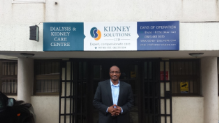The last few years have seen an increasing number of African professionals who have studied and worked abroad returning to work in Africa, partly driven by the economic recession in the West, and partly driven by increasing investment and opportunities on the continent. This phenomenon, which initially seemed to be confined to non-health professionals, slowly appears to also be taking root in the health sector.
We are coming across more and more Nigerians who have spent many years developing expertise in different aspects of health care abroad returning to Nigeria. Interestingly, unlike many in the previous generation of healthcare professionals that returned to Nigeria in the 60s and 70s, many of these are not returning to work in the public sector but are setting up entrepreneurial ventures in the health space.
While they are often driven by the desire to use their newly acquired skills to contribute to a sector that they are passionate about, they are also wary of the challenges of trying to initiate change within an often bureaucratic and lethargic public sector and are intent on building successful enterprises, using innovative approaches to create value, sustainable businesses and provide employment.

Take Emeka Anekwe and Ogo Egbuna, graduates of the College of Medicine of the University of Nigeria. After medical school, they were among the many doctors who left for the USA to develop their skills. Completing the rigorous specialization programmes in internal medicine and sub-specialisation in nephrology, they had started to establish themselves in practice in the US and could have settled comfortably into that lifestyle. However, after many years of practice, they were conscious of the challenges the Nigerian health sector still faced and were keen to do more than settle into a mere professionally fulfilled life in the United States.
Following years of research and due diligence they have recently set up the first completely outpatient dialysis centre in Nigeria – Kidney Solutions in Ikeja Lagos. On a recent visit to their centre, I spent the day with Dr Anekwe talking about the project. It was impossible to miss the passion in his voice as he shared their story with me and the challenges they have faced. Raising funds for the centre was one of the biggest challenges and, now that it is up and running, he is spending a lot of time in Lagos, away from his family, training their staff, not just on the provision of clinical care, but also on simple courtesy to patients, appropriate bedside manners and creating an environment of care and empathy.
Or take Ifesinachi Anyamene, a pharmacist. After a few years of working in various pharmacies in the UK, she established her first pharmacy in the UK a few years ago and has recently set up a second branch in Gwarinpa Abuja, which she intends to manage to the same high standards, ethos and governance structures as the UK pharmacies where she worked for many years.

While I walked round her pharmacy with her, an elderly client entered and Ifesi jumped to her feet to help him steady his balance. His gratitude was clear in his hearty “thank you, my daughter”.
I watched as she attended to him with care – explaining the different therapeutic options available to him, as well as the pros and cons of each option. I waited patiently as she ensured that all his questions were answered before he left. I know that he will be going back to that pharmacy in future.
These two examples illustrate the potential impact returning diaspora health professionals could have, bringing their experience gained abroad to play in their homeland.
Other sectors of the economy have been more forward thinking in utilizing the skills of diaspora health professionals. However, the health sector is starting to catch up. A newly opened Renal and Cardiac centre in Lagos, a private-public-partnership between the Lagos State government and private sector investors, has stated that its primary strategy in delivering a high quality service to patients will be by using Nigerian specialists in the diaspora.
With the recurrent strikes in the public sector and the government challenged by the in-fighting between different professional groups in the health sector, there is a growing argument for a need to completely re-engineer the way health services are delivered.
Some have asked why – given the failure of purely public sector led models has failed to deliver on power, telecommunications and infrastructure – the health sector is expected to be any different.
Maybe the returning diaspora will contribute not just in innovation around how clinical services are delivered but contribute to a complete re-engineering of the health sector. This may only be the beginning of a changing paradigm.



1 Comment